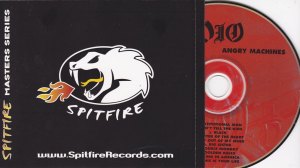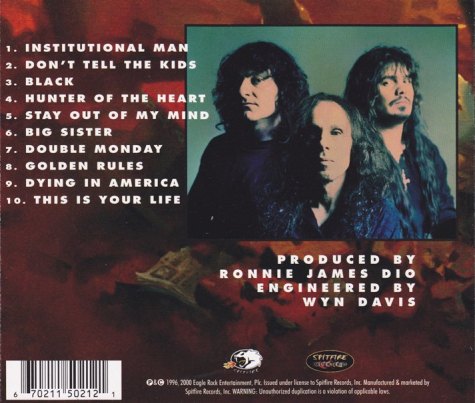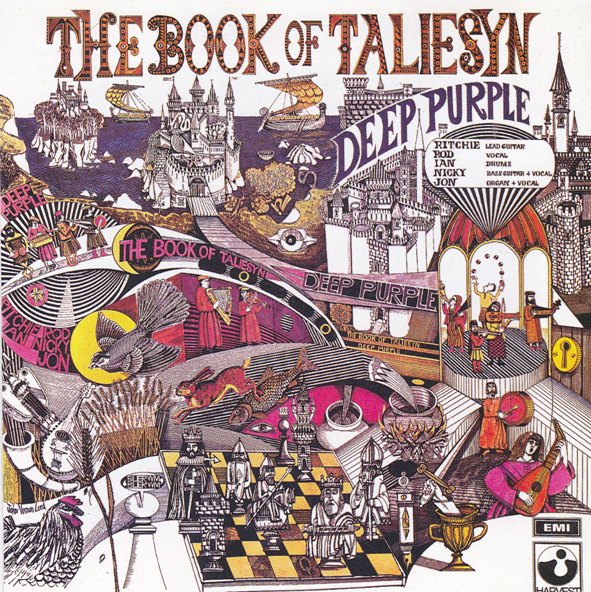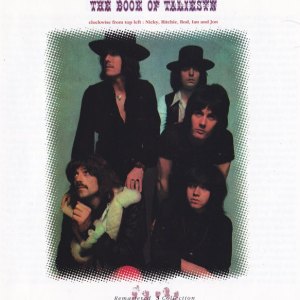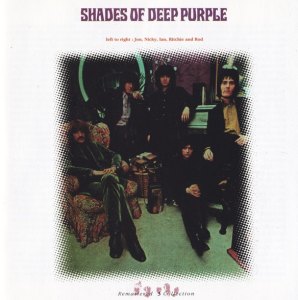DIO – Angry Machines (1996 Spitfire)
I have never liked Angry Machines. Right from the moment it came out, to today, I do not like Angry Machines. It’s not because I don’t like this Dio lineup. I’m quite fond of the Strange Highways record, which features the same band (Jeff Pillson – bass, Vinny Appice – drums, Tracy G – guitars). Given my fondness for that previous record, and the awesome cover art emblazoned upon Angry Machines, I was looking forward to this album. Now, all these years later, even cranked to max volume it has failed to grow on me and remains my least favourite Dio album by a fair margin.
When Dio gets his hands on a treacherously slow heavy metal song, he can sometimes wring great things from it. Angry Machines, however, is bogged down with many agonizingly slow, soundalike trudgy songs. The opener “Institutional Man” almost resembles Born Again-era Sabbath at times for sheer slow chug, but it lacks any sort of hooks. Ronnie is bellowing as incredibly as he always has, but he’s grasping for a melody to hang his powerful voice on. The saving grace is a razor sharp guitar solo by Tracy G.
Thankfully “Don’t Tell the Kids” is a speed metal rocker. I didn’t expect Ronnie to take it to Motorhead tempo, and that’s cool. Lack of hooks is the problem again, so you’re left with little but the smoking instruments to carry you through. MVP: Vinny Appice who has never sounded so lively!
The disc gets stuck in the mud after “Don’t Tell the Kids”. The atonal “Black” doesn’t do anything for me, although I do admire the stripped-back production (by Ronnie and engineer Wyn Davis). I dig Jeff Pilson’s bass hook on “Hunter of the Heart”, and the chorus is pretty good, but the song is mostly forgettable. Then is the slow and boring “Stay Out of My Mind”, a real snooze. A 7-minute snooze with an extended keyboard segue! Continuing with the mind control theme, “Big Sister” isn’t much to write home about either, except in terms of Vinny’s relentless sticks.
“Double Monday” has cool acoustic segment, very unlike typical Dio. Unfortunately this one section does not save the song which is otherwise dreary and grating. Up next, I enjoy the vintage groove of “Golden Rules” but again there’s not much of a song here. Same goes for the penultimate track “Dying in America”.
You may already be familiar with the best song on Angry Machines, a piano ballad called “This is Your Life”, that was re-released on the 2014 tribute album of the same title. When I reviewed that excellent CD, I had this to say of “This is Your Life”:
Fittingly, the album ends on a ballad: Dio’s own somber “This Is Your Life”, performed by the man himself in 1996. I did not like the Angry Machines album, but if there was one song I would have picked as a highlight it would be “This Is Your Life”. Performed only by Dio and Scott Warren on piano, it is unlike anything else in Dio’s canon. The lyrics speak of mortality: “This is your life, This is your time, What if the flame won’t last forever? This is your here, This is your now, Let it be magical.”
The always lucky Japanese fans received a bonus track with the cool title of “God Hates Heavy Metal”. Although I am intrigued I have not been motivated enough to search it out.
2/5 stars



